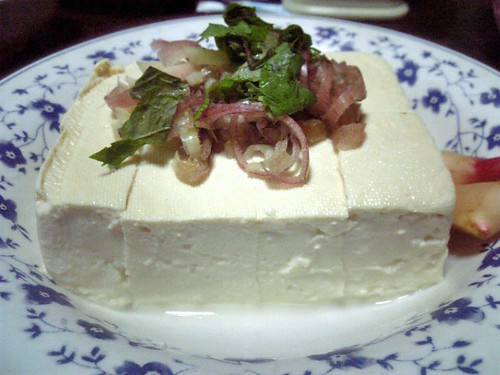Rin: Konnichiwa, minna! I'm Rin ( リン ) from Konohagakure! I'm actually a medical ninja and a member of Team Minato, along with Kakashi and Obito...
Rin: Maybe, today's lesson will be a little boring because I'm all alone, without the Japanese Classroom senpai, Tna-san and Kaoko-san. They're actually already coming back to their hometown. But, I'll give you such a useful lesson. Curious?
Kakashi: Yo, Rin! what kinda lesson you're going to teach them? Medical jutsu?
Rin: Kakashi?
Obito: Rin! Why didn't you ask me to join?
Rin: Obito? Why are you all here?
Obito: Ano sa, ano sa, what are you going to teach them? May I help you? Was Kakashi right about you're about to teach medical jutsu?
Rin: Iie (no). There's no way I teach them medical jutsu since they're not even a ninja. But, I'll tell them about Nippon no kenkoo shokuhin (Japanese healthy food)!
Kakashi, Obito: Kenkoo shokuhin?
Rin: Hai, hai. As we know lately we rarely consumed any healthy food anymore. All we eat contain more cholesterol, fats, and another dangerous chemical substances. Nah, Japanese people often considered as healthy by many countries around the world. These was stated in,
“96% fewer men suffer coronary heart disease in Japan than in Britain”“Only six in 100,000 Japanese women contract breast cancer - 20 times fewer than in Britain”(UK Daily Mail ‘Eat for Immunity’ supplement, Feb 2002)
Obito: Wow, really? That's surprising! How could that happen?
Kakashi: That's simpe. Japanese people love eating fish and soy so much which are rich of protein and vitamin...
Rin: Kakashi is right! Nah, do you know which are from all Japanese food categorized as healthy food?
Obito: Umm... ninjin (carrot) to ka, ringo (apple) to ka, yamaimo (yam) to ka...
Rin: Hai, hai, you're right. Why I suddenly raise this topic? Besides the reason I stated above, nowadays, diseases such heart attack, cholesterol, diabetes, cancer, etc are increasing. So, how we manage to stay healthy is the thing we have to do...
Kakashi: Then, can you start explaining?
Rin: Oh yeah, sure! Mazu wa... in Japanese traditional diet, two things we should omit are sugar and animal fats (except fish)! Because those are considered not healthy and could cause heart problem, obesity, osteoporosis, fractures, etc. Okay, let's continue to our lesson... first is fish...
Salmon
Rin: Fish is much healthier than meat, i.e. beef, pork, lamb etc. which contain large amounts of fat (of the bad variety) and do little to aid digestion. Animal protein can also promote bone disease (see section on calcium / milk). People who consume meat run twice the risk of contracting cancer than consume fish. Fish oil, on the other hand, has many health benefits; just 1 ounce (30g) of ‘oily’ fish a day has been shown to reduce the risk of heart attacks by 50% , but we should not take this fish oil at large amount, because the vitamin A and D stored in liver could build toxic...
Obito: Wow... then, what kind of fish recommended to eat?
Rin: Umm... mostly us, Japanese people, love eating salmon, as the main dish itself, as sushi or mixed with miso soup or such... and also mackerel with ginger. Ginger helps prevent blood platelets from sticking together, lowers cholesterol, helps prevent arthritis and prevent cancer cells from forming. Tuna is also good, but beware of the mercury risk...
Kakashi: Ah sou. Then, how about the risk of eating raw fish?
Rin: It's okay since we immediately eat the served sushi, of course the fish must fresh to avoid from food poisoning. That's why the sushi makers always note not only the day, but also the time it was made...
Salmon sushi
Mackerel with ginger
Obito: Soukka... what about noodles? Are noodles also healthy?
Rin: Yeah, it's included, BUT only noodles made from buckwheat, or in Japanese called soba. Buckwheat is rich in protein, minerals and bioflavonoids, and can help strengthen capillaries as well as with general cardiovascular problems and fatigue. It is also good for the digestion. However, it has been known for some people to suffer strong allergic reactions to it, so be careful if you have food allergies...
Soba
Kakashi: What's another?
Rin: The next one is seaweed. It has long been prized as an excellent source of minerals. Seaweed provides an abundance of these minerals, plus other nutrients such as vitamins A and C (especially konbu) and protein (especially nori - dried seaweed, often serve along with sushi). Seaweed also helps to prevent cancer and heart disease, lowers blood pressure and cholesterol, and can even prevent ulcers and kill bacteria. It also thins the blood; in one test a chemical from wakame seaweed was shown to be twice as effective as the drug heparin at destroying blood clots...
Seaweed
Konbu
Nori
Obito: Oh... I never knew that seaweed contains much mineral...
Rin: You should read the nutritional factors before eating food, Obito...
Obito: But... I just eat what I want to eat...
Kakashi: Yappari you're the weakest Uchiha because you never at least use your brain...
Obito: Ussai na (Shut up)!
Rin: Futari-tomo, yamenasai... maa, tsugi wa miso desu (the next is miso). It is a paste made from soya beans, a product of the fermenting process which produces soy sauce. Miso is soft, brown and sticky - looks disgusting but tastes wonderful! - and also healthy (except for the salt)!
Miso shiru
Kakashi: But I like miso shiru...
Obito: Yeah, umai kara~!
Rin: That's why... nah, another healthy food is kinoko no shiitake (shiitake mushroom). It's widely used for traditional medicine and a common ingredient in Japanese cooking...
Shiitake mushrooms
Rin: Shiitake are high in protein and low in calories, making them especially useful for vegetarians, and contain vitamins, minerals, amino acids and enzymes. They have been shown to have anti-cancer qualities, and help to reduce cholesterol and blood pressure, thereby helping in the fight against atherosclerosis and heart disease...
Kakashi: What kind of dish that can be made by shiitake?
Rin: Any nimono (simmered dish) and also oden...
Nimono shiitake
Oden
Obito: Sou, sou...
Rin: It's a typical Japanese food, made from soy. Do you know what I meant?
Kakashi: Tofu?
Rin: You got it! Yeah, tofu!
Plain tofu
Rin: Tofu (soya bean curd) is very rich in protein but low in calories. It also avoids the fat / cholesterol problem associated with meat and dairy products. As well as protein, it is a good source of calcium and other bone-protecting minerals.It is also said tofu to be the one of the reasons Japanese people are so healthy and long-lived, and it may help protect against cancer...
Obito: But... I don't like plain tofu...
Rin: Don't worry, you can always modify it to other dishes, such hiyayakko (cold tofu), agedashi tofu (deep fried tofu in a soy sauce/dashi based broth), seaweed tofu, miso tofu, and the others...
Cold tofu
Agedashi tofu
Seaweed tofu
Miso tofu
Obito: Hara heta (I'm hungry)...
Rin: Hold on your hunger because we still have magic potato and ocha (tea). Potato or imo (芋) in Japanese is a natural anti-aging and life-enhancing properties. It is rich in Hyaluronic Acid (HA), a substance produced naturally by our bodies in abundance when we are young.
Potato
Rin: Our organs also need this HA to stay in good condition and function properly as it puts moisture into your body at a cellular level, not just on the surface. HA has also been found beneficial in promoting healthy joints, vision, connective tissue, the speedy repair of wounds and the formation of collagen...
Obito: Rin, are you going to try potato for long-live young and ever lasting beauty?
Rin: *punches Obito* Maa ii, about green tea... I'm sure most of you have known about this Japanese typical drink...
Green tea
Rin: Green tea is a powerful antioxidant, can help you lose weight, and really is good for helping you to relax. It is even thought to suppress the development of stomach cancer. It also helps prevent blocked arteries and maintain normal cholesterol levels and strengthens capillaries and lowers blood pressure...
Kakashi: Yeah, the benefits are unquestionable, but how about the caffeine contained in it?
Rin: Yes, most types of tea, including green tea, contain caffeine, sometimes as much as coffee - BUT - coffee (even decaffeinated) contains other harmful substances, whereas green tea, especially, contains substances which promote good health - like anti-oxidants - and recent research shows that the caffeine in tea is actually not harmful because it is ‘neutralised’ by a substance called theanine, an amino acid...
Kakashi: Ah sou da...
Rin: Green tea also stimulates your body’s metabolism, thus helping you to burn those calories faster and therefore can help with weight loss, as part of a total weight-control program, of course. Green tea won’t make you slim overnight just by itself, but it could help...
Obito: Another girls' thing who love 'slim body' so much... *laughs*
Rin: Ussai na! (Shut up!) Well, I think those are enough to represent the Japanese healthy food... any question from both of you?
Kakashi: Ah yeah. Indeed most of us (Japanese people) don't eat meat, cheese, or milk, why don't we suffer from bone disease? Where do we get the calcium?
Rin: Calsium (Ca) is very useful to bones is mostly found in diary products such milk, cheese, and others. It avoids osteoporosis, maintains your body’s pH levels, promotes alkalinity, as an anti-oxidant, combatting free radicals that are implicated in diseases including cancer. Why we don't suffer from osteoporosis? Because we consume another calcium sources like soy, green leafy vegetables, nuts, fish, fish cakes, and seeds...
Fish cakes
Obito: Naruhodo (I see)...
Rin: Well, I think our today's lesson is enough! See you next time, guys~! Watch out what you eat and keep healthy because healthy food invest better in the future than unhealthy delicious food! Sayonara~!
Credits: Japanese Food for Health and other unmentioned sources.






















No comments:
Post a Comment